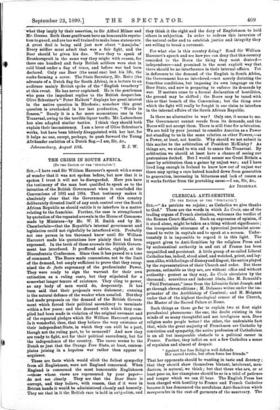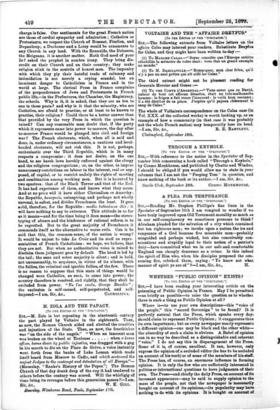CLERICAL ANTI-SEMITISM.
[To THE EDITOR OF THE "SPECTATOR."] $IR,—" As patriots we rejoice ; as Catholics we give thanks to God." These are the words in which La Croix, one of the leading organs of French clericalism, welcomes the verdict of the Rennes Court-Martial. Such an expression of opinion, if it stood alone, might be taken as a thing without significance ; the irresponsible utterance of a hysterical journalist accus- tomed to write in capitals and to speak at a scream. Unfor- tunately it is impossible to regard it in this light. The support given to Anti-Semitism by the religious Press and by ecclesiastical authority in and out of France has been unqualified and persistent. A little group of so-called Liberal Catholics has, indeed, stood aloof, and watched, priest, and lay- men alike, with feelings of dismay and disgust, the antics played by the representatives of their Church and order. But these persons, estimable as they are, are without office and without authority : protest as they may, La Croix circulates by the thousand ; scurrilous and indecent libels, like M. Renauld's "Peril Protestant," issue from the Librairie Saint Joseph, and go through eleven editions ; M. Delassus writes under the im- primatur of the Archbishop of Cambrai ; and M. Meignan under that of the highest theological censor of the Church, the Master of the Sacred Palace at Rome.
Such things as these go far to explain two at first sight paradoxical phenomena : the one, the doubt existing in the minds of so many thoughtful and not irreligious men, Does religion make people better? the other, the undeniable fact that, while the great majority of Frenchmen are Catholic by conviction and sympathy, the active profession of Catholicism is an all but insuperable obstacle to a political career in France. Further, they inflict on not a few Catholics a sense of repulsion and almost of despair.
" Against her foes Religion well defends
Her sacred truths, but often fears her friends."
That her opponents should be wanting in taste and decency ; that they should show themselves blatant, intolerant, men- dacious, is natural, we think ; but that those who are, or at least pose as, her champions should be so is a trial of patience and temper which we can ill bear. The English Press has been charged with hostility to France and French Catholics because it has denounced the scrofulous Anti-Semitism which masquerades in the cast-off garments of the sanctuary. The charge is false. Our sentiments for the great French nation are those of cordial sympathy and admiration ; Catholics or Protestants, we respect the Church of Bossnet, Fenelon, and Dupanloup ; a Duchesne and a Loisy would he ornaments to any Church in any land. With the Renanlds, the Delassus, the Meignans, it is another matter. Hath God need of your lie? asked the prophet in sombre irony. They bring dis- credit on their Church and on their country; they make religion stink in the nostrils of honest men. The impunity with which they ply their hateful trade of calumny and intimidation is not merely a crying scandal, but an imminent danger to Catholicism in France and in the world at large. The clerical Press in France complains of the preponderance of Jews and Protestants in French public life,—in the Prefectures, the Chamber, the Magistracy, the schools. Why is it, it is asked, that they are as ten to one in these posts ? and why is it that the minority, who are Catholics, are afraid to practise, or at least to be known to practise, their religion ? Could there be a better answer than that provided by the very Press in which the question is raised ? Can any reasonable man doubt that, if the party which it represents came into power to-morrow, the day after to-morrow France would be plunged into civil and foreign war ? The French electorate, which, when all is said and done, is, under ordinary circumstances, a cautions and level- headed electorate, will not risk this. It is not, perhaps, enthusiastic over the Third Republic, which is in many respects a compromise : it does not desire, on the one hand, to see harsh laws harshly enforced against the clergy and the religious congregations ; or, on the other, to impose unnecessary restrictions on labour in the interest, real or sup- posed, of capital, or to restrict unduly the rights of meeting and combination among working men. But it is haunted by two spectres : that of the Black Terror and that of the ]led. It has had experience of them, and knows what they mean. And at no price will it have either Clericalism or Anarchy ; the Republic, bourgeois, uninspiring, and perhaps not wholly nnvenal, is safest, and divides Frenchmen the least. It goes solid, therefore, for the Republic : medio tutissi»ius ibis ; it will have nothing to say to extremes. This attitude in so far as it means—and for the time being it does mean—the stereo- typing of abuses and the hindrance of rational reform is to be regretted. But to the great majority of Frenchmen it commends itself as the alternative to worse evils. Can it be said that this, the common-sense, of the nation is wrong ? It would be unjust to take La Croix and its stall as repre- sentatives of French Catholicism : we hope, we believe, that they are not. But when no authoritative voice is raised to disclaim them judgment goes by default. The head is led by the tail; the sane and sober majority is silent ; and is held, not unreasonably, to acquiesce, in virtue of its silence, with the follies, the criminal and ignoble follies, of the few. There is no reason to suppose that this state of things would he changed were Catholics, as such, to come into power; the country therefore is resolved, and rightly, that they shall be excluded from power. " Ta l'as voulu, George Dandin" : the exclusion is self caused; self-perpetrated, and self-



































 Previous page
Previous page